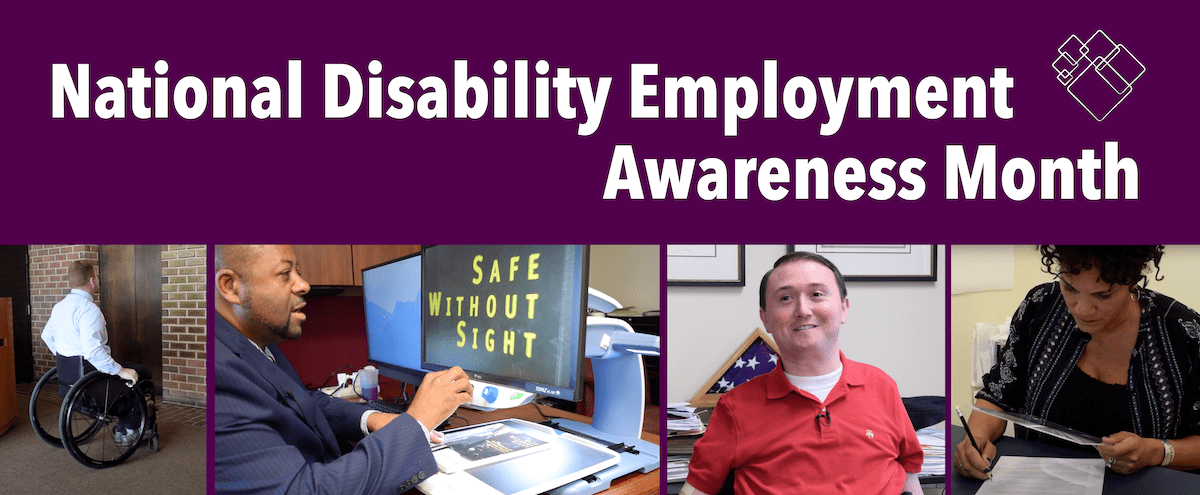
Each year in celebration of National Disability Employment Awareness Month (NDEAM), NDRN highlights the importance of employment opportunities for people with disabilities and gathers stories from individuals with disabilities who are successfully employed in the community.
NDEAM dates back to 1945 when Congress declared the first week in October “National Employ the Physically Handicapped Week.” Since that time NDEAM has evolved to include the entire disability community and the emphasis has shifted to focus on employment in the community at competitive wages.
It is our hope that the stories below will spotlight the multitude of skills and talents of people with disabilities and the important impact that they have on our society.
NDEAM 2021 Take Action Toolkit
National Disability Employment Awareness Month is more than a celebration, it’s a call to action. It’s a time to recommit to the hard work of advocating for better employment opportunities and outcomes for workers with disabilities. Here are a few resources you can you to join us in this important fight.
NDEAM 2020 Podcast Series
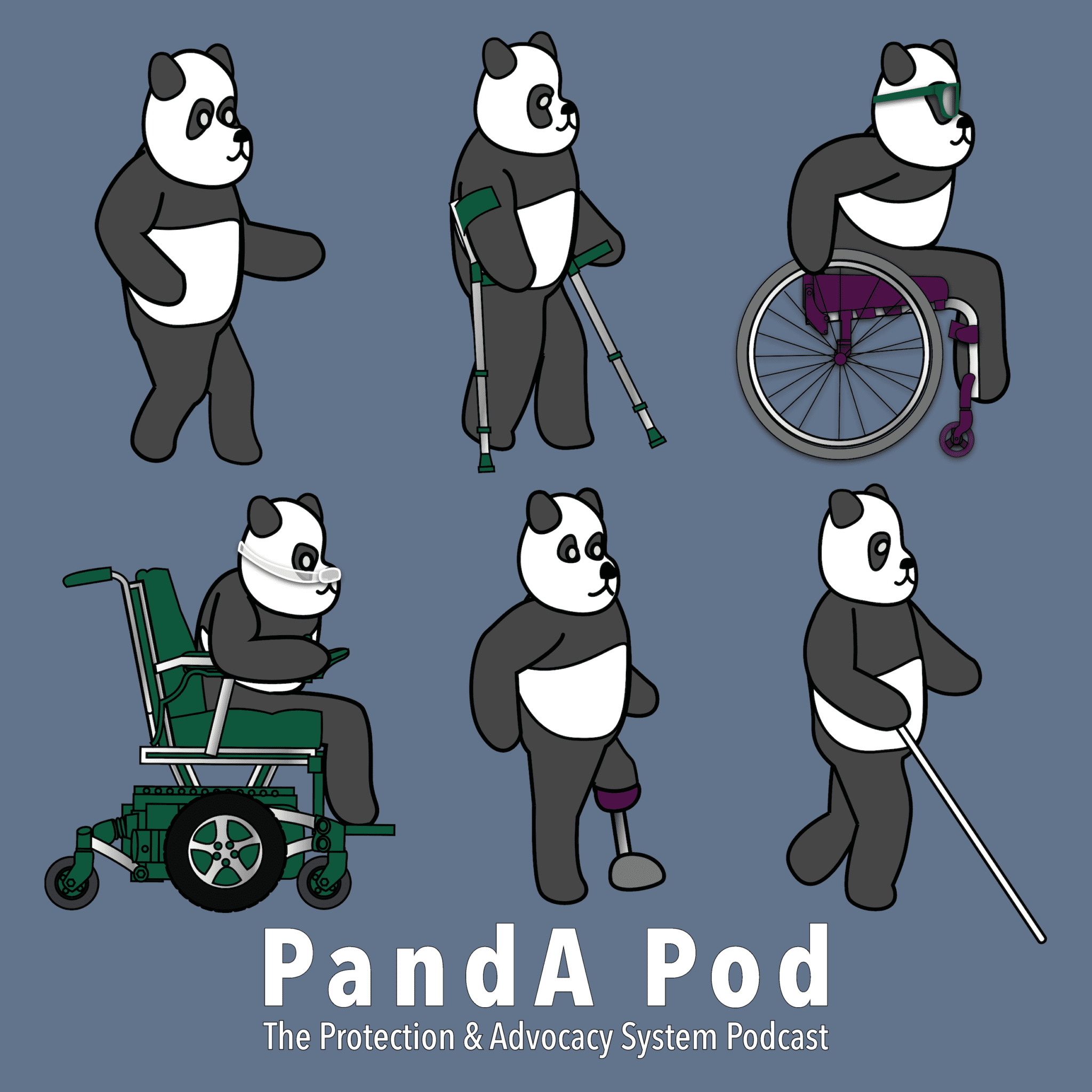
PandA Pod is NDRN’s podcast designed to deliver training, technical assistance, useful and most importantly entertaining content to the P&As and our allies in podcast format.
Subscribe to the PandA Pod now
on Apple Podcasts
by Email
via RSS Feed
on Google Podcasts
on Android
Senator Casey on Economic Self-Sufficiency
This is the first podcast episode of a series celebrating NDEAM 2020. Each episode focuses on different aspects of the legal framework of employment and the barriers to economic self-sufficiency. For this first one, we had the pleasure of speaking with U.S. Senator Bob Casey (D-PA) who explains some of the legislation Congress is considering to improve employment opportunities for people with disabilities.
Assistant Secretary Mark Schultz on High Expectations
Mark Schultz, the current Commissioner of the Rehabilitation Services Administration (RSA) and the Assistant Secretary for the Office of Special Education and Rehabilitative Services (OSERS), discusses the tremendous potential of people with disabilities to successfully obtain jobs in the community. Commissioner Schultz stresses the importance of high expectations – that all people with disabilities can and should work and be able to pursue their dreams. He identifies some of the key issues that should be considered and programs/initiatives that may be helpful throughout an individual’s employment journey, even in the time of the COVID-19 pandemic.
Liz Weintraub on What it Takes
Liz Weintraub shares her unique employment story – her journey from a sheltered workshop to a Senior Advocacy Specialist on the Public Policy team at the Association of University Centers on Disabilities. In this episode, Liz candidly shares the ups and downs of her journey and emphasizes the importance of good employee/employer communication and the use of plain language documents. Be sure to check out Tuesdays with Liz, a weekly video series hosted by Liz and produced by AUCD that highlights current issues in disability policy.
Aaron Kaufman on Playing to Your Strengths
Aaron Kaufman currently serves as the Senior Legislative Associate at the Jewish Federations of North America. In this final podcast episode celebrating NDEAM 2020, Aaron shares his employment journey, including how the Vocational Rehabilitation (VR) program played a positive role as he worked toward his employment outcome. Aaron offers tips to people with disabilities about everything from navigating the VR system to things to avoid doing during job interviews.
NDEAM 2019 Video Series
Welcome from Curt Decker
Josh Basile
Derek M.A. Alexander
Keith Cooper
Allessandra Bradley-Burns
Send off from Commissioner Julie Hocker
NDEAM 2018 Stories

Aaron Kaufman
Aaron has cerebral palsy. He has associated visual and learning disabilities.
Aaron is a Senior Legislative Associate at the Jewish Federations of North America (JFNA). In that role, he is the lead individual on disability policy. He also works with the 147 Federations providing technical assistance if they are seeking to have more inclusive programming. Additionally, Aaron, along with his colleague Mindy Brodsky and others, organized the Jewish Disability Advocacy Day in February during which 220 people came to Washington, DC and met with members of Congress.
Aaron noted that his brother, who has a more severe form of cerebral palsy and needs assistance with all activities of daily living, is his inspiration and “the reason I do what I do.” When asked about the favorite part of his job, Aaron did not hesitate in stating, “I love being in a job where I can get up and fight for my people.” He also noted the “stigma busting” aspect of being an active and visible part of the disability advocacy community is critical.
Aaron was clear that his employer, JFNA has been, “the most accommodating and accepting employer that I’ve ever had.” He noted that JFNA has paid for Dragon Dictate Software and more recently has employed a college student, part-time, to assist Aaron with proofreading his written documents. They have also been very accommodating around requests for medical leave.
When asked about his biggest success, Aaron immediately responded, “I am able to follow my dream, I have always wanted to be a lobbyist for people with disabilities.”
Regarding advice, Aaron noted that sometimes providing accommodations for an employee with a disability can take more of a supervisor’s time and that people with disabilities must strike a balance where they obtain the support they need while not overloading a supervisor’s time.
Aaron also discussed the importance of higher education/additional training. He specifically mentioned the importance of accessing and attending Institutes of Higher Education whether through a degree program, courses for a specific topic or a program through Transition and Postsecondary Programs for Students with Intellectual Disabilities (TPSID).
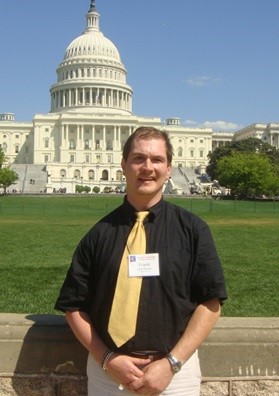
Frank Meeuwis
Frank Incurred a Traumatic Brain Injury (TBI) from a car collision
Frank Meeuwis was born in Pennsylvania, has lived in Europe, and graduated high school while living in Knoxville, Tennessee.
At 18 years of age, he incurred a Traumatic Brain Injury (TBI) from a car collision. He was in a coma for two months and he was initially unable to speak. He used a wheelchair for eight months and then returned to college with some lasting limitations from the injury.
At the University of Tennessee, Frank graduated with both a Bachelor’s degree and a Master’s degree in Social Work (MSW). Since 2007, he has worked as the Director of Quality Improvement and Systems Improvement at the Arc of Tennessee. Frank also volunteers as the Treasurer for the Brain Injury Association of Tennessee and serves on an advisory committee for the Nashville mayor.
He has been married since 2009 to Mary, the person who happened to be his note-taker while he attended college. They have a cat and two sons, Milo and Jack.
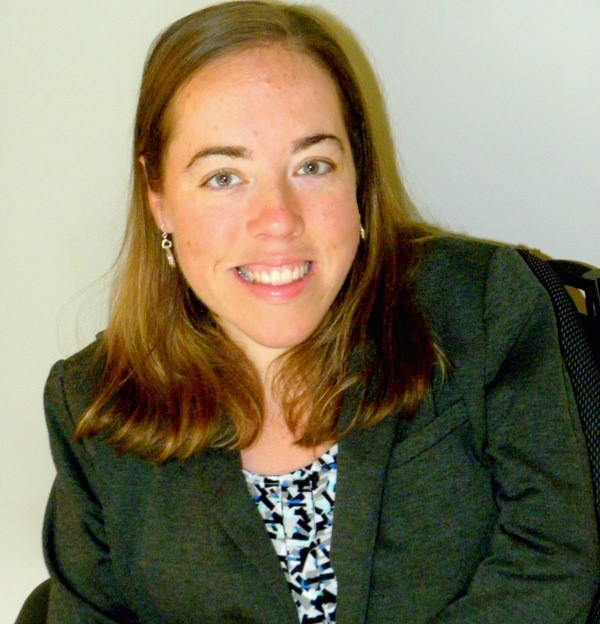
Robyn Powell, MA, JD
Robin has Arthrogryposis which occurs when a person is born with multiple joint contractures. It limits a person’s overall joint mobility and makes it difficult to move easily.
Being an attorney was not something I dreamt about as a child. In college, I majored in social work and after I graduated, I worked as a case manager for adults with intellectual disabilities. Although I absolutely loved my job, I found myself frustrated by the many injustices that my consumers faced. I felt as though I was simply putting Band-Aids on problems, and knew systemic change was desperately needed. These experiences, coupled with my own experiences with discrimination as a disabled woman, led me to law school. I was committed to advancing disability rights.
Since graduating law school in 2007, I have worked for non-profit organizations, the federal government, and universities. Currently, I am a researcher as well as teach disability law. I am also a PhD candidate, where my research focuses on the rights of parents with disabilities. Collectively, I aim to use research to inform disability law and policy.
As a woman with a disability, I have encountered challenges to competitive integrated employment. I have been denied jobs simply because of my disability. I also have to contend with policies that discourage employment for people with disabilities. For example, I need personal care assistants to help me live in the community. Unfortunately, Medicaid is the only health insurer that covers these supports. While I am fortunate my state has a Medicaid buy-in program that allows me to work and still receive Medicaid, many states do not have such programs. In fact, I was forced to move out of one state because I no longer qualified for their Medicaid program; I made too much to receive Medicaid but not enough to be able to afford to pay personal care assistants and still live. Far too often, people with disabilities are forced to choose between getting out of bed (i.e., receiving personal care assistant services) and working.
Working is incredibly important to me. I have dedicated my life to disability law and policy. I also enjoy being a productive member of society—even paying taxes! Working has also afforded me the opportunity to live a fulfilling life, including being a homeowner. I am grateful for competitive integrated employment and believe all people with disabilities should be supported in their employment goals. In sum, we need policies that encourage people with disabilities to work!
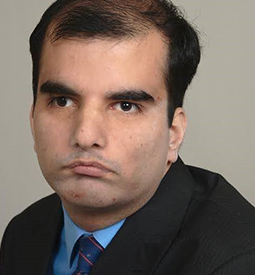
Rak Mehta
Rak has Moebius Syndrome, a neurological disorder characterized by the paralysis of multiple cranial nerves. He also has a mild case of Tourette’s Syndrome.
Currently, I am employed as a Vocational Rehabilitation (VR) Counselor at a state agency where I assist individuals with disabilities in obtaining and maintaining employment in the community. One of my favorite aspects of the job is working with diverse groups of individuals and helping them to reach their vocational goals.
As a person with a disability who has worked for a Fortune 500 company and also for a state agency, I have been constantly told throughout my life that I cannot do something and that I cannot succeed. When you are in a position to not only empower folks, but develop a game plan so that they can throw that ball in the end zone, it makes my day very exciting and fulfilling.
The accommodations I receive through my employer are very informal. For example, one of my main disabilities is that I cannot smile or move my eyes side to side. So, I receive a keyboard with larger letters and Zoomtext (a software program that enlarges the text on the computer screen) to help make it easier for me to see and access my computer.
During my employment journey, I feel one of the challenges has always been finding an accepting employer who understands disability issues. In addition to Moebius syndrome, I am diagnosed with a mild case of Tourette’s Syndrome. I think one of the challenges has been explaining this to my employers and also my supervisors in hopes of some understanding and acceptance. For the most part, I feel both of my employers have been very understanding of my condition. If an employee has an invisible disability and/or something that they cannot control, the federal laws do not protect a person as much as you would think, so we really need to empower employers to be accepting as possible.
Although I had only had one known outburst at my previous job, it did have some impact such as miscommunications which created some stress for me. In my current job, I have had no tics or outbursts. I have benefited from an increased amount of understanding and inclusiveness in this environment. Tourette’s Syndrome is usually triggered by anxiety and a fear of the unknown. If folks are understanding, the fears can become obsolete.
I am working hard to make sure that everyone at my present job knows that I am going to work my tail off each and every day! I am also very transparent and honest. I do not hide my disability or my limitations and, from my experience, that is something that folks really respect.
Never give up, never lose hope, be resilient and have confidence in your abilities. Many times I feel that folks feel that “employers will not hire me based on my disability.” I always tell folks to showcase your strengths, your skills and why you will be good for the job. Employers do not care that you have a disability — they care about what you bring to the table.
I have interacted with four CEOs, three medical directors, an administrator for VR services and other colleagues/staff. They have all cared more about my skills and abilities than my disability. You will get the right job at the right time, not because you are a person with a disability, but, rather, because you are that darn good. Don’t forget to network, network, network! The networks you built fifteen years ago will help you in the present, if you remain in touch.
I have also advice for parents and others who have children with disabilities. Empower them to succeed and embrace their right to fail. During one of my high school IEP meetings, the teacher looked at me and asked, “What do you want to do as a career?” I said “I want to go to a four-year university.”
The teacher looked at my dad and said, “Do you really think he can be successful?”. My dad looked at me and then looked back at my teacher before saying two words I will never forget: “Watch him!” These two words not only empowered me to go to college, but also to go to graduate school. As parents, we really need to be that offensive line for our children. We need to encourage them to lead on when everyone else feels they cannot and we must embrace the chance that they will fail. But, there is also an equal chance that they will succeed!
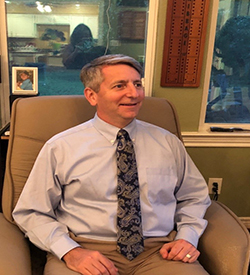
Steve Elliot
Steve has a visual impairment and as a result he needs to use special computer software to read text.
I am an Administrative Law Judge (ALJ) for the Texas State Office of Administrative Hearings. I have served as an ALJ for a year and a half, where I hear and decide cases involving the provision of special education services to students with disabilities. The cases and issues that come before me involve complex legal determinations and challenging factual findings. Most importantly, the cases I preside over impact the lives of students with disabilities and the educators who are committed to delivering special education services. I learn new things every day and strive to issue clear rulings.
To accommodate my visual impairment, I utilize a screen-reader, which is specialized computer software that reads aloud content on a computer screen. With this software, I am able to read documents and emails, conduct research and draft decisions and orders. My legal assistant travels with me to hearings to provide physical accommodations for me.
Persistence is necessary to overcome the barriers and misperceptions that impede the employment of people with disabilities. I try to focus on my strengths and abilities and I look for ways to build and enhance my skills. When an employment option is closed to me, I try to move forward looking for the next opportunity.
It is incredibly rewarding to do meaningful work utilizing my knowledge and talents. I truly enjoy my job and the critical thinking and problem solving it requires.
I enjoy being involved in my community and believe strong communities are built through volunteerism and engagement. I have enjoyed coaching youth basketball and baseball and leading Cub Scout and Boy Scout groups. It has been very rewarding to utilize my background in law to teach youth about citizenship and the U.S. Constitution. Recently, I led a Boy Scout group on an extended mountain backpacking trek, which was physically and mentally demanding for all youth and adults involved.
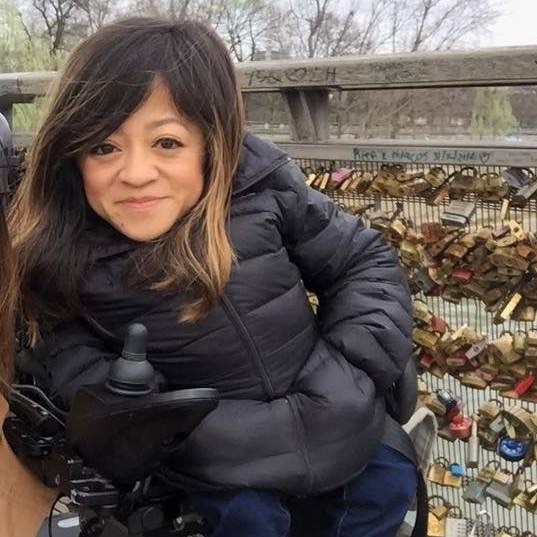
Teresa Nguyen
Teresa has Osteogenesis Imperfecta (brittle bones) and she uses a power wheelchair for mobility.
I’m the Community Liaison for Colorado’s Money Follows the Person program for Colorado’s Department of Health Care Policy and Financing. I communicate programmatic changes, policies and updates to the communities involved with CO-MFP. There are so many things I love about this job, but my favorite part is being able to interact with the communities and individuals that our policies and programs touch.
I use a power wheelchair for mobility and also have a very weak immune system. Some accommodations that I’ve advocated for are: the ability to work from home on days with bad weather, extended protected absences (family medical leave) for when I need to have medical procedures, and flexible work place and hours. A unique accommodation that I don’t always remember to ask for is an accessible mode of transportation when we have to travel for work (a wheelchair accessible van rental).
In my journey, the biggest success has been seeing our small pilot MFP program become a permanent program for Colorado’s Medicaid members. I work with incredibly selfless and motivated people who understand the importance of “choice” in an individual’s health decisions, and working together we were able to have the bill pass in Colorado. Working in state government can sometimes be challenging. Everything has to go through many layers of approvals before implementation and I’m not always a patient person.
The most valuable piece of advice I’ve ever received is to always remember that you have something to offer your employer, too. They have something to lose if you’re not a part of their company.

Ellie Carney
Ellie is young adult with a development disability who currently lives at home with her mother. She is a determined self-advocate who knows what she wants, and she wants to be independent and live on her own.
In fact, Ellie is preparing to move soon into her own apartment. She is able to do this because she has a job she loves and a job that matches her interest and skill. Ellie is competitively employed thanks to the support of DC based agency RCM of Washington.
Ellie is a passionate animal lover and was determined to work with animals she loved. She started out working in a veterinary office but found that some of the tasks created a challenge which diminished her joy in her work. So, she kept looking and found her current job. She works for Dog Walk DC walking dogs, sometimes two – three dogs at a time. She likes being active and walks between five and seven dogs a day. Ellie is thrilled to be engaged in her community. When she is not working she is a strong self-advocate working with her peers on policy issues that affect people with disabilities.
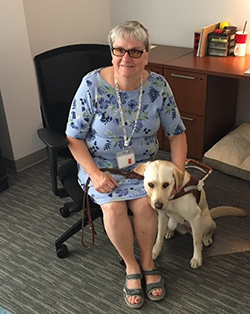
Bonnie Bomer and Fiesta
Bonnie is legally blind and has problems seeing print documents.
I am the Lead Advocacy Specialist on the Employment Team at Indiana Disability Rights (IDR). I advocate for individuals who are facing barriers to employment, such as problems accessing assistive technology to enable them to perform their jobs. Many of my clients are working with the State Vocational Rehabilitation services. These individuals often need assistance with understanding their rights, obtaining the supports they need to achieve their employment goal and appealing when services have been denied. I generally help clients to successfully obtain the results they want through information advocacy and negotiation; that’s my favorite part of this job!
I am legally blind and I have problems seeing print documents. My employer provides a lot of specialized assistive technology to allow me to do my job efficiently. I use a screen reader system that magnifies the text on my computer screen. It also reads information aloud to reduce my eye fatigue. I use a larger monitor and an arm that allows me to position my monitor at a comfortable viewing height. I also have a Closed Circuit Television (CCTV) to read documents. I also use a mini-CCTV that is portable; it allows me to read documents when I’m out of the office. I also have an iPad for working offsite and notetaking.
In addition to the AT, I use a Guide Dog for mobility. Siesta (I call her Fiesta) is a very young yellow Labrador retriever. I have only been working with this dog for 4 months, although I’ve had Guide Dog partners since 1990. My dog enables me to travel safely and confidently as I work outside the office to attend meetings and conferences. IDR ensures that I have breaks to take my dog outside and to play with her (she has an amazing amount of energy!) My coworkers respect my relationship with this new dog and interact with her only when I’ve given permission.
I became employed as a Disability Rights Advocate in 2001, after I completed my Master’s degree in Public Administration from the University of Michigan-Dearborn. Prior to that, I was a Case Manager for people with disabilities who needed community or Medicaid Waiver supports.
My biggest success has been seeing my clients achieve their employment goals, due to my involvement and advocacy efforts. I thoroughly love it when I meet a former client who is now in their dream job! The biggest challenges have been attitudinal barriers (You can’t do that! We don’t hire “them!”). Occasionally transportation is still a barrier for me; it takes some planning and perseverance to overcome that one!
My advice to people with disabilities who want to be employed in community competitive employment is three-part. (1) You will need to be persistent and focused on the goal you want. (2) You must have the education and skills to work in your chosen career. (3) You need to have people who support you as you work toward your goals. Don’t ever give up!

Karl Cooper
Karl was born with a rare condition called TAR (thrombocytopenia absent radii), which resulted in bones being absent in both arms and joint malformations in both legs.
I am the Director of Public Health Programs at the American Association on Health and Disability (AAHD). AAHD is a national cross disability organization with the stated purpose of promoting health and wellness initiatives for people with disabilities. As a person with a very visible physical disability, I feel as though I can be a good representative for the disability community and speak with a credible voice as I explained what it means to make programs fully inclusive and accessible.
My physical disability affects my extremities as I have short arms and bowed legs. While I am able to walk short distances, my legs do prevent me from long distance walking requiring the use of a wheelchair. AAHD has been very understanding in making sure I have an office that allows me to move around with my wheelchair without any difficulty. However, the most important accommodation I require in the workplace is for dictation software to help me with typing. While it is a relatively small investment for an employer to make, dictation software has been a huge help to me and my productivity levels.
My employment journey has been a long one as I started as an attorney practicing law in Pennsylvania where I’m originally from, but I did not get a complete sense of fulfillment in that role. When I began doing pro bono disability advocacy, I found more fulfillment in that work than I did in my regular law practice. As a result, when my wife had the opportunity to take a job in the DC area, it provided me with an opportunity to do disability advocacy on a much larger level. While it may seem cliché, this has been one of my biggest successes – finding greater fulfillment in my job and what I do on a day-to-day basis.
I mentioned my use of dictation software as an accommodation. I would say my greatest challenge was bringing myself to the point of using it. I had tried it earlier in my legal career, but the technology was not as advanced and it became too frustrating. I had found workarounds that allowed me to do the typing on my own, but it was not nearly as effective or efficient. When someone suggested I try dictation software again, I initially resisted due to concerns with how effective it would be, but also due to my pride in not wanting to admit that I needed the assistance. However, once I did begin to use it, I realized how far the technology had come and how much it would improve my productivity.
The biggest piece of advice I could give would be to be honest with yourself and others. Make sure that you understand what your capabilities are and don’t limit yourself if those capabilities could be improved by reasonable accommodations. If you know what accommodations would help you succeed, then letting an employer know that at the beginning when you first start will allow you to be a success from day one. Don’t think that you’ll be able to do it on your own without the accommodation if the accommodation will increase the likelihood of your success in the job. If you’re honest with yourself about what you’re able to do and then convey to your employer up front what accommodations will help you be successful, it will allow you to succeed from the beginning and increase your confidence going forward.

Liz Weintraub
Liz Weintraub happens to have an intellectual disability. She is a full-time member of the policy team at the Association of University Centers on Disability (AUCD).
Liz’s aspect of her job is the podcasts that she hosts on a weekly basis, appropriately titled “Tuesdays with Liz”. These podcasts cover a wide range of disability-related topics and include guests that she really enjoys interviewing.
Liz also attends Capitol Hill meetings and takes every opportunity to share her passion about disability rights with various Representatives and Senators. Most recently, Liz testified in front of the Senate Judiciary Committee regarding the nomination of Brett Kavanaugh to the Supreme Court.
Liz says that she is literally “living her dream.” Despite the fact that she started out performing meaningless, repetitive tasks (making less than minimum wage) in a sheltered workshop environment, Liz always dreamt of working on Capitol Hill. She said the biggest thing she had to overcome was “other people’s attitudes.” According to Liz, “Even my parents weren’t enthusiastic when I told them I wanted to be a lobbyist. But, I really wanted to be able to tell my story and I wanted to try to show other people what was possible.”
When asked what kind of advice Liz would offer to other people with disabilities who are seeking employment, she said simply, but emphatically, “Have a dream and don’t ever give up!”
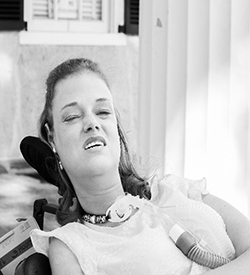
Josie Badger
Dr. Josie Badger CRC, DHCE has a significant physical disability, which requires the use of a ventilator, power wheelchair, and 24-hour nursing care
It was never a question whether I was going to college and eventually get a job, the question was how. Regardless of my significant physical disability, which requires the use of a ventilator, power wheelchair, and 24-hour nursing care I was expected to pursue and obtain my maximum potential.
I obtained a bachelor’s degree in disability law and advocacy, a master’s degree in rehabilitation counseling, and a doctorate in healthcare ethics as the initial part of my journey of establishing my own corporation, J Badger Consulting Inc. This corporation provides disability technical assistance, advocacy, and consulting in transition services to organizations within Pennsylvania and across the country. Currently, the corporation works under two contracts, the first is the #IWantToWork Campaign where I am the Campaign Manager and the second contract is through a grant provided by the Rehabilitation Service Administration, called the RAISE Center where I am the Project Co-Director. The #IWantToWork Campaign develops, educates, and advocates for legislation that will improve the employment outcomes for people with disabilities throughout Pennsylvania. Through this campaign two Pennsylvania bills were passed between 2016 and 2018, which improve the potential for individuals with disabilities to obtain competitive employment. The RAISE Center provides technical assistance to parent training and information centers across the country that are working with families and youth with disabilities during transition.
Through my business I am able to work in various areas and on numerous projects. Some of my responsibilities include public speaking, development of publications, maintaining social media outlets, contracting with other organizations, and working with our state legislators. I knew that because of my physical needs and accommodations, my ideal position would allow me to work from home with flexible hours. By establishing my own business, I am able to do a majority of my work from my fully accessible home, during the hours that I am strong enough to work. My business also provides me with the necessary accommodations to complete my work such as speech to text software, computer, and a tape recorder.
Being employed provides me with a sense of dignity, self-worth, and independence that could not be obtained through any other activity. Through it I am able to be a productive and engaged citizen, contributing my skills, gifts, and money into society while also reducing the amount of cash benefits that I would otherwise require without paid employment.
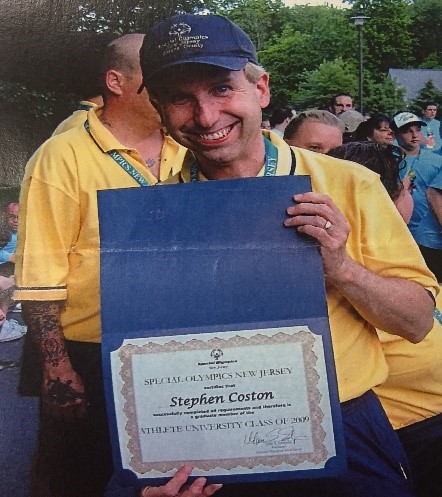
Stephen Coston
I have an auditory processing disability. 1979 was my senior year at the Bergen County Vocational School in Teterboro, New Jersey. At that time the Division of Vocational Rehabilitation Service program had upgraded grant programs for post-secondary education for Special Needs Adults ages 21 and up to have the opportunity to go to college or any other post-secondary training program. I was fortunate to receive those funds for my eligibility for higher education training at a program called the Para Educator Center at New York University. It was a program that teaches young adults with various disabilities to become Teacher’s Aides or Assistants.
I worked as a Teacher’s Aide for one year only making a poverty income at $6000 per year from 1981 to 1982. Then I was laid off due to cut in Federal Funds.
I did not want to end up in a dead end job making a stagnant salary such as working in a supermarket stuffing grocery bags or these workshop trainings that were being provided for disabled people who had intellectual or development disabilities. I was mainstream. But no one understood that during the 1970’s to the mid 80’s.
I invested my own finances to go back to school. I studied at Dover Business College to learn computer courses. I graduated with a College Diploma in March of 1993. Previously I worked for AEP Inc. (Automated Excluding Plastics) for 20 years, but I was laid off in August of 2017 due to a Corporation merger. I am working as a Mail Room Supervisor for Coach Inc. With my salary I can support myself and my wife.
During the time I was unemployed, I went for training at the One Stop Career Programs and improved my academics in reading and math. From 5th grade level in reading and math, I improved in reading to 12 grade in reading and 10th grade in math through the Learning Link program which uses computers to help students with disabilities get the high school diploma or GED.
Eunice Kennedy Shriver said, on the 50th. Anniversary of the Special Olympics, “YOUR DAYS OF SEGREGATION AND ISOLATION ARE OVER”! As a Special Olympics Athlete of New Jersey, I am included on the Special Olympics Sports Complex of New Jersey Wall Poster in tribute of Inclusion Sports for the Special Olympics. However, this is true not only in sports. Inclusion also includes careers and good paying jobs, education and living on your own. This is what integrated employment means to me.
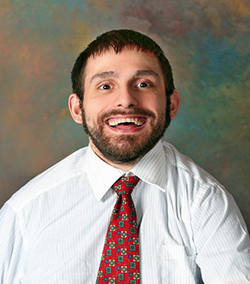
Bryan Dooley
Bryan was born with cerebral palsy. It impacts all four of his extremities as well his speech. Bryan uses a power wheelchair for all mobility and an augmentative communication device allows him to effectively have conversations with other people.
I currently have two part-time jobs. Both of them have to do with educating people about disability rights. I work with a local lawyer, Bailey Liipfert, gathering content for his social media platform. I also regularly write blogs for the Arc of North Carolina, pertaining to disability rights issues. The Arc of North Carolina focuses on advocacy and services for individuals with intellectual and developmental disabilities. My favorite part about both of these jobs is that I get to help out others by imparting my knowledge to those who might not be as sufficiently informed.
Right now, I’m working exclusively out of my house. Both of my employers are supportive of my ability to work in the community. I have a flexible schedule, so I can attend various disability rights meetings. The law firm continues to look for a better work location for me, so I can have my own office space.
I am proud that I was able to procure these jobs without the assistance of federally-funded programs such as Vocational Rehab (VR) and others. The challenges, in my case, are that VR didn’t adapt very well to my changing employment goals. When I initially signed up with VR, I expressed some interest in going to law school. As I went through college, I became more interested in writing and journalism. But, VR’s job placement efforts were less successful once I started to focus on writing.
In full disclosure, I would not follow my path. It’s much harder to create your own opportunities. Instead, I would engage VR and other employment supports early and often! They can help facilitate and identify additional options.
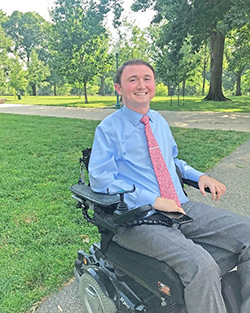
Josh Basile
Josh is a C4-5 quadriplegic paralyzed from the shoulders down with limited movement in his right arm.
I am a medical malpractice attorney working in Washington, DC. Every day I get to fight for our clients that have been catastrophically injured due to the negligence of hospitals and healthcare providers. My favorite part of my job is the special connection that I make with our clients given my unique quadriplegic disability. Most attorneys don’t look like me or have experienced what I’ve gone through as a C4-5 quadriplegic. My disability journey allows me to provide an empathetic ear and voice to our clients and family members that have similarly experienced a catastrophic injury. That special connection is the best!
My employer purchased a special office phone attachment that robotically lifts my office phone and transfers all incoming calls to my Bluetooth earpiece. This assistive technology allows me to communicate with my office colleagues and independently communicate in both incoming and outgoing calls.
My biggest challenges and successes throughout my employment journey revolved around my pursuit of a higher education. As a high-level quadriplegic, I needed help both through technology and through caregiver supports to live outside of a nursing home, to complete activities of daily living, to get to and from school, to be an active student in the classroom, and to complete assignments and tests. Early on I enrolled in multiple government funded caregiving and vocational assistance programs. My caregivers helped me to live independently at home, and commute to and from school. Note takers in the classroom helped to take detailed notes and write down homework assignments. Assistive technology allowed me to complete tasks that previously required the use of my fingers. All of my books and assignments were electronically scanned to PDF. This allowed me to do all my reading on the computer screen or on my tablet. In order to complete assignments or take tests I would use voice recognition software to type out my answers. I also have the option to dictate my answers to a caregiver or scribe who would then put my responses to paper. All of these challenges were overcome thanks to my willingness to always try. After many years of hard work I successfully navigated undergrad and law school where I graduated both with honors.
You’re not alone in your pursuit of employment. Both state and federal programs exist to help you live outside of a nursing home and reach your employment goals. Enrolling in these programs can provide the tools and supports needed to both survive and thrive in the community. It is important to understand that you are not alone while pursuing your employment goals. State caregiving programs exist to improve independence and prevent institutionalization. State vocational programs exist to help you gain access to technology, education and/or trainings towards a particular vocation. Employment benefits counselors exist to help navigate Medicaid buy-in and similar work incentive programs.Other working persons with disabilities with your similar circumstances have become employed and if you can reach out or connect with such persons you can learn from their employment journey struggles and successes.
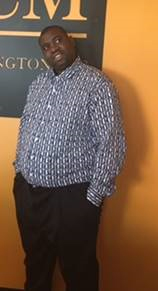
Barry Irby
Barry Irby is a man on the go! He has an Intellectual/Developmental Disability. Barry has not one, but two jobs in competitive integrated employment, and three if you count his volunteer work.
Barry considers himself a people person who connects well with others and has a lot of self-motivation. He is goal oriented, likes to speak in public to motivate others, and prides himself on healthy eating habits. Barry is also a young man with a disability.
Barry applied to vocational rehabilitation for services to help him find employment. He was referred to RCM of Washington where they worked with him to identify his vocational interests. Barry expressed a strong desire to go to work.
His first job was at the grocery store Giant. Initially he was provided a job coach through supported employment services. Being the fast learner that he is, he quickly learned his job and become independent using the natural supports of his coworkers to instruct and mentor him on the work site. Proud of his accomplishments, he wanted to advance his career and become a full time stock clerk.
Currently, Barry works at Harris Teeter where he has been for the past ten months. Barry is employed in guest services at Fed EX Field for his second job and works one game a week. Consistent with his desire to keep busy, he also spends time at a local nursing home as an unpaid volunteer. Disability has not prevented him from working competitively, making money, and increasing his independence.
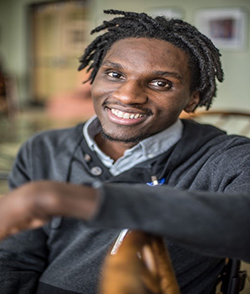
Zac Bradley
Zac is a quadriplegic as a result of a spinal cord injury. He uses a wheelchair for all mobility and has decreased strength and dexterity in his hands because of his injury.
Prior to my spinal cord injury at age 19, I planned to be a physical therapist. After the injury, realizing that becoming a physical therapist may no longer be feasible, I was uncertain of a viable career option. However, by working with Clayton State University’s Disability Resource Center, I found a new career path – rehabilitation counseling.
I committed to this path, which has afforded me opportunities to intern at the Georgia Vocational Rehabilitation (VR) agency, work at the Shepherd Center (a rehabilitation center in Atlanta), and work for the Georgia Advocacy Office, the designated Protection and Advocacy (P&A) agency for people with disabilities in Georgia.
Being able to have a competitive, integrated job has allowed me to fulfill the goals I set for myself as a young child. Immediately after my injury, I had no clue about the possibilities and thinking about my future provoked anxiety. With some assistive technology and minor accommodations, I am able to work efficiently.
Now, seven years later, my greatest accomplishment is having the opportunity to be financially independent and live the life of any working age adult, with or without a disability. In addition, as an employment advocate at the Georgia Advocacy Office, the best part of my job is helping other individuals with disabilities reach their employment goals.
I believe that everyone has the ability to work. I advise seeking the necessary training or education needed to be successful in your chosen occupation. I believe that with the proper reasonable accommodations, a person’s disability is no longer the focus. The focus, instead, becomes his/her strengths and abilities, allowing the individual to thrive in the workplace.
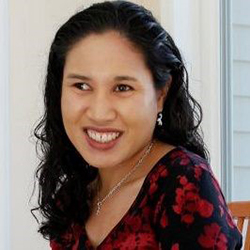
Grace Strother
Grace has a visual impairment as a result of glaucoma. She is employed full-time and uses assistive technology and other reasonable accommodations to perform her job duties at a software company.
I am a proposal coordinator at a software company that serves the nonprofit sector. Basically, I help the sales teams create written proposals for competitive bidding processes. Our goal is to demonstrate to nonprofit organizations that our solutions and services will help them accomplish their mission.
My favorite part of the job is creating order from chaos! Developing sales proposals is a complex, often stressful process, but it is quite satisfying to deliver a compelling, professional document on time with the hope that we can help another organization do good in the world.
My employer pays for my assistive technology, a ZoomText screen reader/magnifier, and any necessary updates. More specifically, ZoomText enlarges and enhances everything on my computer screen, echoes my typing and automatically reads documents, web pages and email.
I also have an adjustable workstation that allows me to position my monitor and keyboard so I can sit close enough to read comfortably.
I consider my biggest success to be continuing to find ways to grow and contribute throughout 14 years at the same company. At times I wasn’t sure where my career was going, but in my current role I have been able to help transform my area of the business, improving the way we manage proposals and changing the culture around the proposal process.
My biggest challenges are time management and maintaining boundaries. I am fortunate that my managers support a healthy work/life balance for their employees, but I still have difficulty finding the time and energy for work, family, church, and graduate school studies. I have to remain diligent about not taking on more than I can handle in any area of life because I want to give my best to the things that matter most, like my work.
In addition to getting the necessary educational credentials and/or experience, communication skills are absolutely essential. It is impossible to serve customers, sell to customers, collaborate on teams, and get hired for new jobs if you can’t communicate clearly in a persuasive manner.
Specifically regarding my disability, I have always approached each new hiring manager ready to demonstrate what I can bring to the business. My goal is to help them focus on my abilities and not my disability. I also proactively explain what I do to compensate for my disability and how I have never encountered major problems in the workplace because of it.
Once managers understand the situation and recognize I will be a net asset to the team, they consider my disability a non-issue. It also doesn’t hurt that I have built up a network over my time at the company, so when hiring managers ask around about me, they get positive feedback.

Ian Watlington
Ian Watlington has cerebral palsy (since birth) which affects the way he moves about the world. He uses both a power and manual wheelchair.
In my current position, I train and give assistance to the nationwide network of 57 Protection and Advocacy agencies (disability and civil rights organizations) that fight for the rights of people who live with a disability. It is the largest cross-disability organization in the country.
My specific duties include working with other folks with disabilities and making sure these organizations are aware of the issues that are facing them, and strategies of incorporating people with disabilities in their daily work, not just as clients but partners. Along with the self-advocacy component to my job, I work on our mental health advocacy grant; and finally, I help the organizations develop and organize the ways they refer clients and give them short-term assistance. My job is a unique amalgamation of important functions of the organizations that make up the disability rights network.
My favorite part is the strategizing I am able to do with these organizations and seeing it make a difference, because, in the end, that successful assistance helps people with disabilities.
I receive some accommodations because I am a wheelchair-user. There are certain days when I am unable to get to the office because of inclement weather and NDRN allows me to work from home. In addition, I have a reading disability, similar to dyslexia, so I am provided a screen-reader and dictation software. These are vital because they allow me to deliver higher quality work.
In my work journey, the hardest part is to know when to ask for additional help. With my disability, I often have muscle tension/spasms; therefore, it is hard to know how much to disclose when I am in pain. Plus, just like most people, dealing with the personal and professional life balance is a vexing challenge.
I believe that working in the community comes from expectations. People strive when their expectations and the expectations of others around them are high. This is not fluff, but the fuel that you will need in order to work in an integrated job in the community. Also, you deserve this. You got this. Is it going to be hard, no doubt, but it is worth it. You do not have to do this alone; surround yourself with allies and let them help you succeed at being who I know you want to be. You. Got. This.

Wilbert Johnson
I have an intellectual disability. My Journey to empowerment is amazing!
I went through a transition program that my high school told me about called the Paycheck. In the transition program the Paycheck staff also taught me how to be independent – they taught me how to catch the bus on my own and they also taught me how to use my own bank card. I even gained more skills because my dad taught me how be more independent. I even would help some of the others students in the program learn the skills I have been taught.
I worked at University Medical Center. My position was patient access. I would help the patients sign in for their appointments. I really loved working there because I made the patients feel welcome and not nervous. I went to a local university job fair. At the job fair, the guest service manager at the Audubon Zoo said he loved my personality and he said he saw something in me. And I was interviewed a couple days later. I got hired right on the spot! I been working at Audubon Zoo for 12 months and will make a year on October 31st. I love my job so much because they accept me for who I am. That’s why I believe a person with disability should have the opportunity to work. My entire life has changed in so many ways working here at Audubon Zoo. I also have inspired so many others people at work as well. I see myself in a couple of years being a supervisor.
I love my Journey to Empowerment because it feels amazing to have a Job and make your own money. My goal is to inspire other people with a disability to take the opportunity to get a Job. They will accept YOU if they accepted me.

Robert Robinson, Esq.
Robert has been profoundly deaf since birth. He utilizes the services of qualified American Sign Language interpreters for office meetings, settlement conferences, and court appearances.
Robert is a Senior Staff Attorney with Disability Rights New Jersey (DRNJ). During his 16-year tenure with DRNJ, he has represented and counseled individuals with disabilities throughout all phases of Americans with Disabilities Act, Section 504 of the Rehabilitation Act, New Jersey Law Against Discrimination, and Individuals with Disabilities Education Act litigation with emphasis on special education, employment discrimination, and public accommodation claims. During court hearings, a paralegal/advocate takes notes and handles relevant documents to ensure he remains focused on the interpreters and making necessary objections.
Robert takes pride in the fact his skills in strategy planning, legal research, settlement negotiations, and trial advocacy have culminated in many successful outcomes for his clients. Despite his successes, his tenure has not been without challenges. For example, he has had clients who refused to work with him because of their discomfort with the relay system, which many deaf professionals use to telecommunicate.
He encourages all individuals with disabilities to work extremely hard to prove doubters wrong because the harsh reality is that disability discrimination is still prevalent in today’s society.

Kay McMillan
Kay was born with cerebral palsy. It impacts all four of her extremities as well her speech.
As a person with a significant physical disability, my passion for disability rights turned into a job to spread awareness about what people with disabilities can accomplish in the workforce. After graduating from North Carolina State University in December of 2017, I landed a contract position at O’Neill Communications as the Creative Director for one of their projects, which was the publication of the “One Workforce: Inclusive Employment in North Carolina” digital Lookbook.
Similar to the experiences of other recent college graduates, I felt the first taste of success in my employment journey when I received the email congratulating me that I got the job! Sponsored by the North Carolina Council on Developmental Disabilities (NCCDD) and the EveryBODY Works NC campaign, the Lookbook showcases 30 North Carolinians with disabilities working in competitive employment while living full lives in the community.
As the Creative Director, I served as a project manager in addition to the project manager at O’Neill Communications. My responsibilities included hiring photographers, recruiting subjects, supporting three photographers, selecting photos to publish, editing copy for the project, and presenting the Lookbook to NCCDD for approval.
Since O’Neill Communications is based in Georgia, I had the convenience to work from home. However, I did go into the office at the NCCDD once a week, where they gave me an office with enough turning radius for my power wheelchair and where I could maneuver to my desk. I also had an assistant for a couple of hours a day to assist me with typing and any other manual tasks that were required of me.
Since gaining meaningful employment, one of the biggest barriers that I have faced is navigating “the system” to understand the complexities of how employment affects social security and Medicaid benefits. I received conflicting information about how my job impacted my benefits. It was as if the answers to my questions were in a secret language and everyone who tried to translate them into English gave a different version!
My advice to others who are currently seeking competitive employment is to keep your options open and be open to any jobs that come your way. When I initially saw the opening for the Creative Director, I wondered if I was qualified with my background in Political Science. However, I submitted my resume and the rest was history. You will never know unless you get out there and start submitting applications!
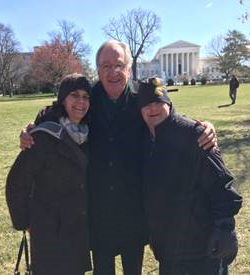
Evan Nodvin
I want to tell you about my life in my community and how important it is to me to be an independent man.
I have Down syndrome and am proud of my abilities.
I graduated from Chamblee High School in the class of 2000. I was in the marching band and got to play and march at all the football games. I made a lot of friends.
Transitioning from child to adult services is very difficult. My family and I had to fight hard for what I wanted – to get a job and live independently. But laws like the ADA and Olmstead help people like me get the services I need to be successful and reach my goals.
After graduation, I started working at the Marcus Jewish Community Center of Atlanta. I have worked there for 18 years in different jobs. I now work in the Health Club. I check the clients in on the computer. I make sure the equipment is in good working order and collect used towels and fold the clean ones. Most of all, I love to talk to the many people who come to the health club. I know all their names, love greeting them, and enjoy joking with so many people.
My co-workers have become some of my best friends. They help me when I need some extra help. We eat lunch together and sometimes go out together on the weekends. I have even been the best man at my co-worker’s wedding!
I live in an apartment with a friend I chose as a roommate. I do all the things a single man does like grocery shopping, cooking and cleaning the apartment, paying my bills and managing my checkbook.
I enjoy music, playing computer games, playing sports, exercising with a trainer, and hanging out with my friends. I have a girlfriend and like going out with her. I also enjoy acting and perform in a theater group.
I am proud to be a member of the Georgia Council on Developmental Disabilities. I attend Council meetings and get to present at national conferences. I learned how to be a self-advocate from a program called Partners in Policy Making. I have met with my elected representatives in Washington, D.C. and in Georgia. I like to follow the news and vote in every election.
My parents and sisters are happy to see me living my dreams. They tell me that these are their dreams, too.
As you can see, my life is very full. I work, live, and play in the community. My dream is to continue this healthy and useful life.
